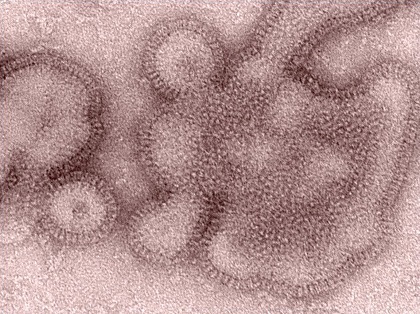Flu Vaccine not Working Well; Only 23 Percent Effective

This year's flu vaccine is doing a pretty crummy job. It's only 23 percent effective, which is one of the worst performances in the last decade, according to a government study released Thursday.
The poor showing is primarily because the vaccine doesn't include the bug that is making most people sick, health officials say. In the last decade, flu vaccines at their best were 50 to 60 percent effective.
"This is an uncommon year," said Dr. Alicia Fry, a flu vaccine expert at the Atlanta-based Centers for Disease Control and Prevention, who was involved in the study.
The findings are not surprising, though. In early December, CDC officials warned the vaccine probably wouldn't work very well because it isn't well matched to a strain that's been spreading widely.
Each year, the flu vaccine is reformulated, based on experts' best guess at which three or four strains will be the biggest problem. Those decisions are usually made in February, months before the flu season, to give companies that make flu shots and nasal spray vaccine enough time to make enough doses.
But this year's formula didn't include the strain of H3N2 virus that ended up causing about two-thirds of the illnesses this winter. And that strain tends to cause more hospitalizations and deaths, particularly in the elderly, making this a particularly bad winter to have a problem with the flu vaccine.
Indeed, the flu season is shaping up to a bad one. Health officials are comparing it to the nasty flu season two winters ago, and this one may prove to be worse. Hospitalization rates in people 65 and older are higher than they were at the same point in the 2012-2013 season, according to CDC data.
The results from the preliminary study weren't large enough to show how the vaccine is working in each age group, although flu vaccines traditionally don't work as well in elderly people.
The study involved 2,321 people in five states — Michigan, Pennsylvania, Texas, Wisconsin and Washington — who had respiratory illnesses from November to early January. The researchers said vaccinated people had a 23 percent lower chance of winding up at the doctor with the flu.
The CDC began regularly tracking the effectiveness of the flu vaccine during the 2004-2005 season, but the results for the first few years were from smaller studies and are considered less reliable. Effectiveness has ranged from 47 percent to 60 percent in the last half-dozen years, when studies involved larger numbers of patients.
It's only in those last several years that "we really understand what's really going on" with the flu vaccines, said Dr. Arnold Monto, a University of Michigan flu expert and another author of the study.
CDC officials say people should still get a flu shot this year. Recently, the flu season in the U.S. has peaked in January or February, but people can continue to get sick for months. And they could get infected by the flu strains that were included in this year's version.
The vaccine's disappointing performance affected the family of a woman who worked on the flu study at the Marshfield Clinic in Wisconsin. Kelly Mathews, of Wisconsin Rapids, said she makes sure her three sons get flu shots each year — especially after they got very sick in 2009, when swine flu was raging and vaccine was scarce.
But her 7-year-old son, Corbyn Lemper, developed a lasting cough and was diagnosed with the flu just before New Year's. Mathews said the flu shot might have at least kept him from becoming really sick.
"It's better to get it," she said.



